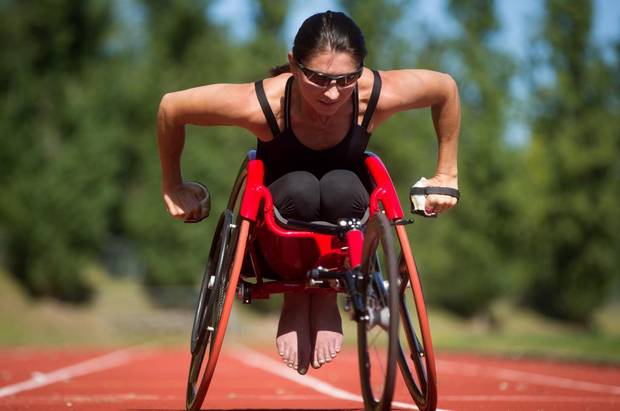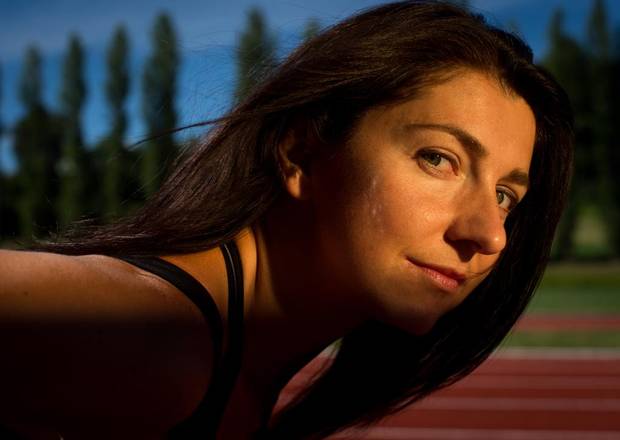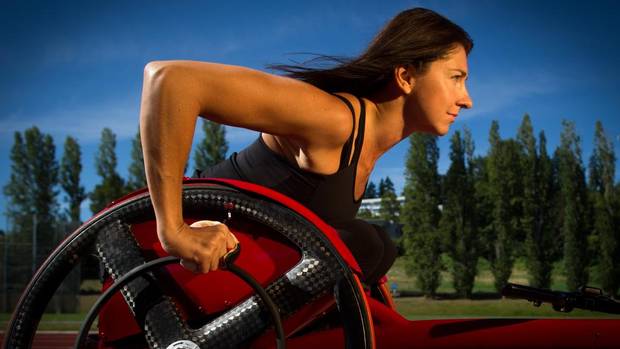Michelle Stilwell is the first to admit it: The past year and a half hasn't been easy.
The rookie Social Development Minister, appointed to the post last February, has faced intense criticism from advocacy groups who want the B.C. Liberal government to further increase income assistance to people with disabilities.
She's since been called vulgar names, and even had death threats directed her way – not what she expected when she joined the political world as the MLA for Parksville-Qualicum in 2013.
"It's made me certainly have to strengthen my mental game, to be able to block those negative comments out and keep a positive attitude," she said in an interview.
Ms. Stilwell, arguably, needs both her mental – and physical – game to be stronger than most.
Along with her busy political career, she is also a world-class athlete competing in the 100-metre and 400-metre wheelchair races in the Paralympic Games in Rio, which begin Sept. 7.

DARRYL DYCK/THE GLOBE AND MAIL
A quadriplegic, Ms. Stilwell is a four-time world-record holder and three-time gold medalist wheelchair racer in Beijing and London, who also won silver in London in 2012. In addition, she took a gold medal in Sydney in 2000, from her previous life as a wheelchair basketball player.
This year, however, is different: It will be the first time she'll compete in the Paralympics as a full-fledged politician.
"I actually was reflecting on that the other day, just how much strength and determination I've needed for my training this past year and a half. Because it's been – it's been in solitude," she said.
RELATED: IPC worries Rio has run out of money ahead of Paralympic Games
The busy schedule of an MLA means Ms. Stilwell, 42, hasn't attended training camps with her team or any international events to prepare, as she has in the past.
"I feel very removed from much of it. So it's a different atmosphere for me right now," she said.
Her days begin as early as 5 a.m. Six days a week, she trains in a wheelchair on a static treadmill-like device set up in her home gym or office. She compliments her racing with yoga, weights and swimming in the evenings, all to build strength in her arms, trapezius and back muscles.
"I get up very early in the morning or I train very late at night after my work day is done, when I can squeeze it in," she said.
She likens her time-management skills to a "triage" – always prioritizing what needs to be done first.
"If I try and put it off and say I'll do it later, work always takes over. Something always comes up, and then it affects your training," she said.

DARRYL DYCK/THE GLOBE AND MAIL
Her journey to Paralympic sport began with a remarkably mundane accident.
At 17, Ms. Stilwell broke her neck after falling off a friend's back during a piggyback ride. Before her accident, Ms. Stilwell played ringette, baseball, basketball and ran track. "When I had my injury, life changed. But not for the worst, just different," she said.
She acknowledges going through hard times, but choosing to be positive.
"I think anybody who goes through a life-changing, altering injury has those moments. It's whether you decide to let yourself dwell on them, or whether you pick yourself up and decide this is my life, this is my one chance at it, how am I going to live it?"
RELATED: Quebec paralympic cyclist receives messages of support after bikes stolen
She took up wheelchair basketball, but left the sport due to complications from her spinal-cord injury. She married and had a son, Kai, who is now 15. She thought her sports career was through.
Then, while coaching a wheelchair basketball tournament in 2004, Ms. Stilwell met Peter Lawless. The Paralympic coach, now vice-president of the Canadian Olympic Committee, noticed Ms. Stilwell, who was demonstrating in her wheelchair, right away.
"I couldn't get over how fast she was," Mr. Lawless said. "I figured out that she was a quadriplegic, and then I kind of freaked out a little, because I was like, that's really impressive."
(Ms. Stilwell, a C6 quadriplegic, has use of her arms but does not have full hand or wrist function. She competes in the Paralympics "T52" category.)
"I just noted right away how quick she was already moving. And I was like, you know, that looks like someone that we could make something special happen here," Mr. Lawless said.
Ms. Stilwell was initially resistant to the idea of racing.
"I kind of laughed and said no, no, no I'm good," Ms. Stilwell recalled. "He was very persistent. He phoned and he phoned and he e-mailed and he kept inviting me to events where finally I gave in and I said, 'Fine I'll come and I'll try.' "
"She might say I stalked her," Mr. Lawless said. "It took some months of harassment, but she saw the light eventually."
In her first attempt at racing, she lost to a 9-year-old boy. She vowed she would never go down again.
Ms. Stilwell, who says she loves the training aspect of competition, describes her movements while racing as a "punch" – and her remarkable hand speed comes in, well, handy.
Michelle Stilwell competes and wins the Silver medal in the Final of the Women’s 100m T52 at the London 2012 Paralympic Games.
Daniel Marcotte/Canadian Paralympic Committee
"You don't actually push the wheels, you punch the wheels, and then you flick down and back and get your hands up again on the rim as fast as you can."
Mr. Lawless, who remains her coach to this day, attributes Ms. Stilwell's success to a delicate balance of innate talent and hard work.
"It took several years of pretty ruthless commitment to transform her into what she's become. And then to keep that going is a lot of years and a lot of hours," he said.
"She's an exceptional person. … Quite extraordinary, actually. I tend to talk about her in the context of being a generational athlete, just one in a million."
RELATED: Russia banned from competing in Paralympic Games, will appeal decision
Although she doesn't like to say it, this will likely be Ms. Stilwell's final year in Paralympic competition.
"I need to focus on this experience and this process so that I can accomplish the goals I've set out for Rio," she said.
And what are those?
"Top the podium in the 100 and the 400 [metre races]," she said, without hesitation.
"I'm not going to Rio for the experience. I'm going to win."
